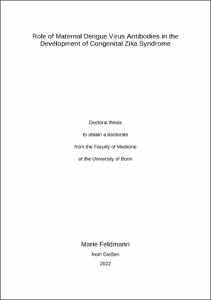Role of Maternal Dengue Virus Antibodies in the Development of Congenital Zika Syndrome

Role of Maternal Dengue Virus Antibodies in the Development of Congenital Zika Syndrome

| dc.contributor.advisor | Kümmerer, Mareike | |
| dc.contributor.author | Feldmann, Marie | |
| dc.date.accessioned | 2022-05-16T13:28:52Z | |
| dc.date.available | 2022-05-16T13:28:52Z | |
| dc.date.issued | 16.05.2022 | |
| dc.identifier.uri | https://hdl.handle.net/20.500.11811/9803 | |
| dc.description.abstract | The Zika virus (ZIKV) epidemic and sharp increase in the number of microcephaly cases in the Americas in 2015-2016 led to the documentation of congenital zika syndrome (CZS) in children born to mothers who were infected with ZIKV during pregnancy. CZS encompasses several structural anomalies and functional impairments caused by damage to the nervous system. A cluster of CZS appeared in northeastern Brazil leading to the question of potential cofactors affecting the development of the syndrome. ZIKV is a flavivirus showing antigenic similarity to the dengue virus (DENV) subtypes endemic in many parts of the world, including northeastern Brazil. DENV is known to mediate complicated immune responses with a higher rate of severe disease reported in secondary infections with a subtype differing from the initial infection. Although not completely understood, antibody dependent enhancement is one theory explaining this phenomenon. Here the antibodies against the primary infecting subtype do not fully neutralize the secondary heterotypic virus and rather ease the uptake of viral particles into certain cells. As multiple antibody epitopes are preserved between DENV subtypes and ZIKV we hypothesized, that specific DENV antibodies present in maternal blood could affect the development of CZS during maternal ZIKV infection. Serum from a cohort of Brazilian women infected with ZIKV, who gave birth to children either with CZS or without CZS, was tested for DENV subtype-specific antibodies to elude if a difference in DENV exposure existed between the two groups. To carry out these subtype-specific tests, plaque reduction neutralization tests were established and validated. Our results show that antibodies against two or more DENV subtypes were significantly more prevalent in mothers who gave birth to children without CZS compared to those who gave birth to children with CZS. As antibody responses against two or more DENV subtypes leads to immunity against all subtypes, maternal DENV immunity may rather lead to a reduced risk in developing CZS during maternal ZIKV infection. As the magnitude of DENV antibody titers did not correlate with the risk of developing CZS and as T-cells have been shown to play an important role in the DENV immune response, both humoral and cellular DENV immunity, which would include T-cell response in vivo, may also play a vital role in the development of CZS. DENV immunity and its role in CZS plays an important role especially in the development of vaccines for endemic areas. A wholesome immune response should be elicited by DENV vaccines as to not only protect against heterotypic infection, but possibly also aid in reducing the risk of CZS. The development of CZS seems to be multifactorial including factors such socioeconomic standing, which need to be investigated further. Our findings did not show an exacerbation of CZS through the presence of DENV antibodies, but they also do not seem to account for the full immunological picture. The complexity of the immune response to these viruses becomes increasingly important as changes in climate and urbanization are leading to a further spread of vectors carrying the disease throughout the world. | en |
| dc.language.iso | eng | |
| dc.rights | In Copyright | |
| dc.rights.uri | http://rightsstatements.org/vocab/InC/1.0/ | |
| dc.subject | Dengue | |
| dc.subject | Zika | |
| dc.subject | Virologie | |
| dc.subject | Kongenitales Zika Syndrom | |
| dc.subject | Virus | |
| dc.subject | Mikrozephalie | |
| dc.subject | Antikörper | |
| dc.subject | congenital zika syndrome | |
| dc.subject | microcephaly | |
| dc.subject | virology | |
| dc.subject | antibody dependent enhancement | |
| dc.subject | plaque reduction neutralization assay | |
| dc.subject.ddc | 610 Medizin, Gesundheit | |
| dc.title | Role of Maternal Dengue Virus Antibodies in the Development of Congenital Zika Syndrome | |
| dc.type | Dissertation oder Habilitation | |
| dc.publisher.name | Universitäts- und Landesbibliothek Bonn | |
| dc.publisher.location | Bonn | |
| dc.rights.accessRights | openAccess | |
| dc.identifier.urn | https://nbn-resolving.org/urn:nbn:de:hbz:5-66610 | |
| ulbbn.pubtype | Erstveröffentlichung | |
| ulbbnediss.affiliation.name | Rheinische Friedrich-Wilhelms-Universität Bonn | |
| ulbbnediss.affiliation.location | Bonn | |
| ulbbnediss.thesis.level | Dissertation | |
| ulbbnediss.dissID | 6661 | |
| ulbbnediss.date.accepted | 11.04.2022 | |
| ulbbnediss.institute | Medizinische Fakultät / Institute : Institut für Virologie | |
| ulbbnediss.fakultaet | Medizinische Fakultät | |
| dc.contributor.coReferee | Hübner, Marc Peter | |
| ulbbnediss.contributor.gnd | 1268243175 |
Dateien zu dieser Ressource
Das Dokument erscheint in:
-
E-Dissertationen (2062)




